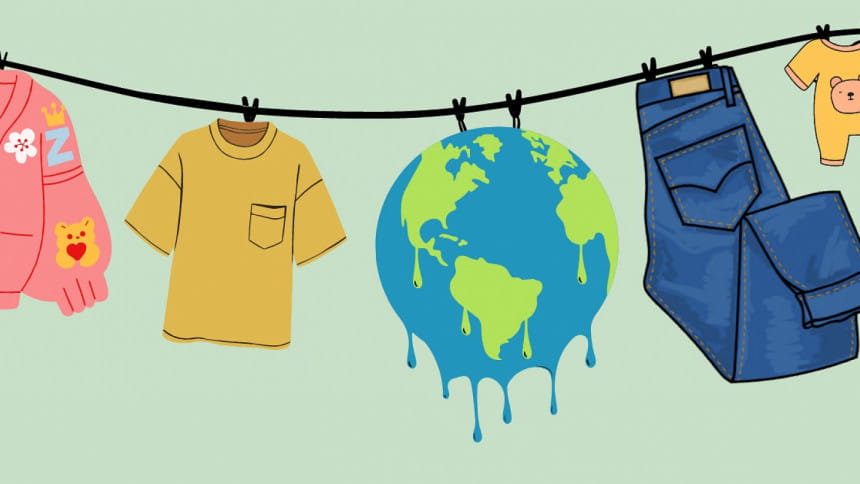SBTi debate has major implications for RMG suppliers

A row has broken out about the Science Based Targets initiative (SBTi), a corporate climate action organisation, which could have significant implications for garment manufacturers around the world, depending on how it plays out. The SBTi is the world's best-known initiative that supports global enterprises in their efforts to reduce carbon emissions in line with sciences aligned with global agreements such as the Paris Agreement. Many of the world's largest fashion brands have set science-based targets for 2030 and beyond.
The biggest challenge in meeting these targets has been in reducing Scope 3 emissions—in supply chains, essentially. For fashion brands, reducing the amount of CO2 emissions related to garment production and textile processing is a huge task, especially given that so much of this manufacturing takes place in countries that use "dirty" energy such as fuel and gas.
Up until now, the SBTi has indicated that in order to meet their science-based targets, signatories must make absolute reductions in their carbon emissions. In order to do this, they would need to support their supply chains in the transition to renewable energy sources.
This is no easy task. It also explains why fashion brands have been in prolonged conversations with their suppliers in recent years to look at how they can measure and reduce carbon emissions.
Recently, however, the SBTi issued a statement suggesting they would, moving forward, allow voluntary carbon offsetting schemes to contribute to CO2 emissions reduction targets in supply chains. This news was significant for the fashion industry as many brands are indeed struggling to reduce Scope 3 emissions while also hitting business growth targets.
The SBTi said that, when properly supported by policies, standards and procedures based on scientific evidence, the use of environmental attribute certificates for abatement purposes on Scope 3 emissions could function as an additional tool to tackle climate change. Consequently, SBTi decided to extend their use for the purpose of abatement of Scope 3 emissions.
After the SBTi issued this statement, there was a huge uproar among environmental activists. They claimed that by allowing carbon offsetting to contribute towards emission abatement, the SBTi was taking a huge risk. Why? Because it has long been argued that carbon offsetting schemes are not trustworthy and poorly regulated.
Indeed, in recent years, we have seen a number of scandals whereby such schemes were shown to be bogus and/or contributing very little to environmental causes. Environmentalists are also concerned that many such schemes take place in remote parts of the world, so are difficult to monitor.
After the backlash, the SBTi responded quickly and issued another statement. This time, it said it was reviewing the situation and would update its guidance later this year. For now, it seems that we are back to a situation where carbon offsets are not allowed to be used in lieu of absolute reductions in carbon emissions.
Why is all this important? It's actually a huge debate for fashion supply chains—and suppliers in Bangladesh.
If the SBTi were to choose to allow carbon offset schemes to be used to help brands meet their climate goals, the pressure to directly cut supply chain emissions would be greatly reduced. I am not suggesting that fashion brands would take the easy road and rely solely on offsets in order to meet their climate targets. What I do think, however, is that brands would suddenly feel they had breathing space after several years during which they have struggled to balance business priorities with the need to reduce their carbon emissions.
So what now? From what I have learnt so far, even many Western nations are finding it challenging to meet the ambitious climate goals they have signed up for. Shifting to renewable energy is a slow and cumbersome process. We are talking about a completely new way of doing things as we dismantle the energy infrastructure which fuelled the industrial revolution.
I am all for progress and as many of my colleagues and friends will know, I have spent more than a decade championing environmental causes. I am also, however, a pragmatist. The way I see it, the only way some industries are going to reduce their emissions in the short term is to stop growing, period. This would mean recession and major societal upheaval. Do we want that?
Perhaps there is a middle way. Maybe the carbon offsetting schemes that have been discredited in the past could be improved. What if countries collectively pump billions into tree-planting and reforestation? What if huge amounts of money is invested in new carbon capture technologies so we can find out whether they work or not, and the level of impact they can have? I see no reason why such schemes could not at least provide a partial solution. There is always a way, but I agree fully that poorly regulated offset schemes cannot be allowed to derail environmental goals.
My advice to the SBTi would be to open up a debate on this issue. Invite the experts on board and ensure that all discussions take place in an open and transparent manner. These issues affect us all, and discussions around them should not take place behind closed doors.
Mostafiz Uddin is the managing director of Denim Expert Limited. He is also the founder and CEO of Bangladesh Denim Expo and Bangladesh Apparel Exchange (BAE).
Views expressed in this article are the author's own.
Follow The Daily Star Opinion on Facebook for the latest opinions, commentaries and analyses by experts and professionals. To contribute your article or letter to The Daily Star Opinion, see our guidelines for submission.

 For all latest news, follow The Daily Star's Google News channel.
For all latest news, follow The Daily Star's Google News channel. 










Comments